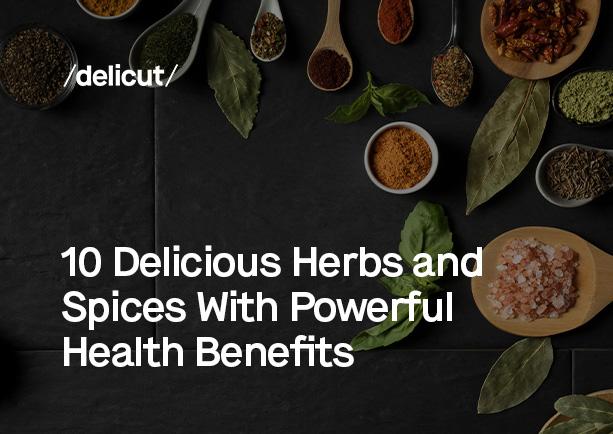10 Delicious Herbs and Spices With Powerful Health Benefits

Across the archives of history, the importance of herbs and spices has remained unwavering, casting their influence within medicine and the culinary domain.
Indeed, many of these botanical wonders harbor substantial advantages, from their anti-inflammatory prowess to their potential as cognitive enhancers, with select varieties even thought to contribute to the battle against cancer.
In an era preceding the approach of modern pharmaceuticals, these herbs and spices stood as the foundation of curative practices, upon which people relied wholeheartedly for their remedial attributes. Discover a world of flavors and health benefits with these powerful herbs and spices!
10 Super Herbs and Spices With Health Benefits
These herbs and spices wield significant benefits even when integrated into our cooking in modest amounts. Each harbors distinct components and minerals that effectively influence the human body.
Turmeric
According to sources, turmeric boasts a wealth of advantageous qualities, including its anti-inflammatory, antioxidant, antibacterial, antiviral, and antiparasitic properties.
These attributes collaborate to scavenge detrimental free radicals within the body, mitigating risk through their potent antioxidant effects. Moreover, turmeric aids in alleviating the impacts of stress on the body.
Research studies highlight turmeric's potential to enhance cognitive function, combat Alzheimer's disease, diminish the likelihood of heart ailments and cancer, and alleviate symptoms of arthritis.
Cinnamon
Cinnamon, a widely used spice in various recipes and baked goods contains cinnamaldehyde—a compound responsible for its medicinal qualities. With potent antioxidants, anti-inflammatory properties, and the ability to reduce cholesterol and blood lipids, cinnamon's true strength lies in regulating blood sugar.
It achieves this by slowing carb breakdown during digestion and enhancing insulin sensitivity.
Studies demonstrate that in diabetic patients, cinnamon can notably lower fasting blood sugars by 10%-29%, a substantial reduction. Generally, an effective daily dose ranges from 0.5-2 teaspoons or 1-6 grams of cinnamon.
Ginger
Since ancient times, ginger has been used to ease nausea and address gastrointestinal concerns. Scientific findings reveal that a dosage of one gram or greater of ginger proves effective in relieving nausea triggered by morning sickness, chemotherapy, motion sickness, and sea sickness. Moreover, ginger's formidable antioxidant content bestows it with potential anticancer properties. Its anti-inflammatory attributes contribute to pain relief and the amelioration of stiffness.
Rosemary
Research has substantiated rosemary's robust antibacterial, antiviral, and antifungal attributes. These qualities stem from its active constituent, rosmarinic acid, which curbs allergic reactions and nasal congestion. Furthermore, rosemary is a reservoir of essential nutrients, including iron, calcium, and vitamins A, C, and B-6. These components bolster the immune system and enhance blood circulation, potentially reducing infection susceptibility.
Beyond its nutritional value, rosemary's taste, flavor, and aroma wield considerable efficacy. According to sources, its fragrance contributes to mental clarity and serves as a stress reliever, particularly in chronic anxiety or hormonal imbalances related to stress.
Peppermint
Peppermint serves as a flavoring agent and encompasses a host of additional benefits. Peppermint contains cooling effects and antibacterial properties. Thus, its oil enhances pain management for individuals with irritable bowel syndrome (IBS). Furthermore, peppermint plays a pivotal role in aromatherapy by augmenting nasal potency.
It acts as a cooling agent, inducing relaxation of colon muscles, thereby alleviating discomfort during bowel movements. Similarly, it assists in the reduction of abdominal bloating.
Sage
Throughout history, sage was used in averting the plague during the Middle Ages. It is frequently harnessed to enhance brain function and memory, particularly among individuals grappling with Alzheimer's. Moreover, sage boasts an abundance of vitamins and minerals, along with antioxidant properties that support the body's defenses.
Research studies have demonstrated sage's efficacy in combatting cavities, throat infections, dental abscesses, infected gums, and mouth ulcers. It also alleviates menopausal symptoms, including mitigating hot flashes, excessive sweating, vaginal dryness, and irritability.
Cayenne Pepper
Cayenne pepper frequently graces our spicy dishes and is a prevalent component in weight loss supplements. Capable of suppressing appetite and enhancing fat burning, this spice derives its distinction from capsaicin, a potent compound. Moreover, cayenne pepper is a notable vitamin reservoir with exceptional antioxidant content. Similarly, it is reputed to shield the body against inflammation and facilitate the digestive process.
Garlic
Containing the distinctive allicin compound responsible for its characteristic aroma, garlic encompasses many medicinal properties and health advantages. Primarily, it counters ailments such as the common cold while simultaneously strengthening the immune system and reducing elevated blood pressure.
Furthermore, garlic effectively lowers cholesterol levels and is a preventive against cancer. Research has unveiled its potential to enhance athletic performance, facilitate body detoxification, and safeguard against cognitive ailments.
Fenugreek
Fenugreek finds its typical application in Ayurvedic medicines and is additionally employed to amplify libido and masculinity. It exerts numerous health benefits, including reducing blood sugar levels, testosterone elevation, and milk production augmentation for breastfeeding mothers. Furthermore, fenugreek houses bioactive compounds, anti-metastatic attributes, antidiabetic effects, anti-inflammatory properties, and other benefits.
Holy Basil
Deviating from standard basil, holy basil can hinder the growth of diverse bacteria, yeasts, and molds. According to sources, it can enhance the function of the immune system and lower blood sugar levels. Moreover, it finds extensive utilization in addressing anxiety and depression linked to anxiety, showcasing its noteworthy therapeutic significance.
Conclusion
Undoubtedly, herbs and spices enhance our meals, enhancing flavor and aroma. Simultaneously, they stand as powerful sources of numerous health advantages and impacts. For relief or prevention of health issues without resorting to traditional medications, Incorporating herbs and spices that heal, even crafting personalized seasoning blends, can effectively address various health concerns.
These powerful herbs and spices have extensive health advantages and are easily accessible. Integrating them into our daily dietary habits can affect our health and overall well-being.
FAQs
1. What are the top 10 herbs and spices?
The top ten herbs and spices include:
- Holy Basil
- Fenugreek
- Garlic
- Cayenne Pepper
- Sage
- Peppermint
- Rosemary
- Ginger
- Cinnamon
- Turmeric
2. What herbs and spices have amazing health benefits?
Many herbs and spices offer remarkable health benefits, including:
- Turmeric: Anti-inflammatory and antioxidant properties.
- Ginger: Aids digestion and reduces nausea.
- Cinnamon: Helps regulate blood sugar levels.
- Garlic: Supports the immune system and heart health.
- Rosemary: Improves cognitive function and digestion.
- Basil: Contains antioxidants and has antimicrobial effects.
- Mint: Soothes digestion and eases headaches.
- Sage: Enhances memory and has anti-inflammatory properties.
3. What are the top 10 super spices that protect your body?
The top 10 herbs and spices that protect your body include turmeric, cinnamon, ginger, rosemary, peppermint, sage, cayenne pepper, garlic, fenugreek, and holy basil.
4. Which herb has the most health benefits?
Turmeric is widely considered to possess substantial health benefits owing to its potent anti-inflammatory and antioxidant properties.
5. What is the best herb to take daily?
Turmeric is often regarded as the optimal herb for daily consumption due to its numerous health-promoting properties, which include potent anti-inflammatory and antioxidant effects.
Read More:
The Benefits of Including Superfoods in Your Diet
Healthy Food Swaps: Small Changes for Big Health Benefits
Exploring Plant-Based Protein Foods for a Healthier Diet
The Power of Mindful Eating: How to Develop a Healthy Relationship with Food
The Link Between Diet and Mental Health: Foods for a Happy Mind
Related Blogs
The Burnout Diet
Jan 30, 2026 | 8The mental load of “What should I eat today?"
Jan 22, 2026 | 8The real glow-up starts with your gut health
Jan 14, 2026 | 8Healthy food that doesn’t taste like “Diet Food”
Jan 17, 2026 | 8Why do most people in the UAE get their calories wrong
Dec 8, 2025 | 6DASH Diet Meal Plan
Nov 11, 2025 | 8Fatty Liver Meal Plan
Oct 31, 2025 | 8Pregnancy Diet Meal Plan
Oct 27, 2025 | 82000 Calorie Meal Plan
Oct 1, 2025 | 8Intermittent Fasting Diet Plan
Sep 5, 2025 | 8






